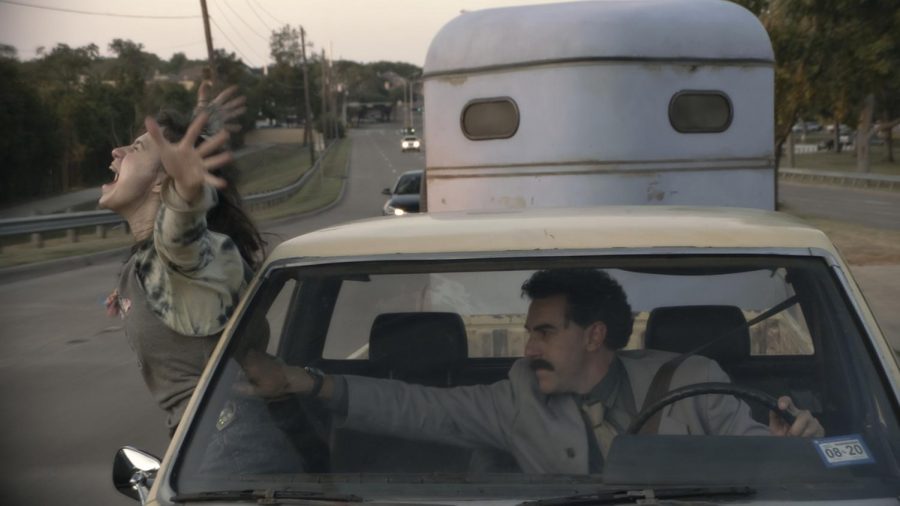‘Borat Subsequent Moviefilm’ Shines a Light on the Danger of Satire
November 7, 2020
Jason Woliner’s sequel to the 2006 mockumentary “Borat” follows Kazakhstani journalist Borat (Sacha Baron Cohen) as he travels to the US with his daughter (Maria Bakalova), exploring women’s rights, the COVID-19 pandemic and American conservatism along the way. The duo and their unscripted interactions caught on camera are fun to watch — but the movie’s intentions end up falling flat.
Constant Controversies
Crude and unapologetic, “Borat Subsequent Moviefilm” has had no scarcity of controversies. A hidden-camera interaction with Rudy Giuliani, President Trump’s personal attorney, has been making headlines since July — before the film was even announced. Giuliani made a statement before the film’s Oct. 23 debut to justify the footage in which he is seen putting his hands down his pants in front of co-star Bakalova, who he was told was a journalist.
But the Giuliani debacle isn’t the only controversy surrounding “Borat Subsequent Moviefilm.”
Cohen and his team have been accused of unfairly duping two women — Jeanise Jones, a babysitter unemployed at the time of filming, and Judith Dim Evans, a Holocaust survivor — into participating in the film. These women’s real-life conversations are pivotal plot points in the film, but both were supposedly convinced that they would be in a serious social justice documentary. After Evans’ death earlier this year, her daughter filed a lawsuit against Amazon arguing that “had Ms. Evans been informed about the true nature of the film and purpose for the interview, she would not have agreed to participate.”
Despite the controversies, many critics applaud the activism and timeliness of “Borat Subsequent Moviefilm.” From Cohen’s infiltration of a legitimate rally held by Vice President Mike Pence while wearing a Donald Trump disguise, to Bakalova’s discussion of masturbation in front of an actual club of shocked Republican women, the two dove head-first into relevant issues. I admit that the film’s irreverence is refreshing at times, but most of the time the satire is just too sloppy to be effective.
Satire is in the Eye of the Beholder
As I watched Cohen casually reference a “daughter ownership manual” to learn how to cage his subservient 15-year-old (Bakalova) and potentially other young women, I remembered a scene in Todd Phillips’ “Joker.”
There’s a moment when the soon-to-be-Joker, Arthur Fleck (Joaquin Phoenix), visits a bar for a stand-up night while a male comedian on stage makes obscene jokes at the expense of women and people with disabilities. The naive, socially awkward Fleck doesn’t understand the jokes being told. The scene seems like it’s meant to be satirical — viewers are supposed to be repulsed by the men of Gotham and the power structure they enforce. But “Joker” didn’t flesh that idea out, and as a result, many men in the audience I was sat in, genuinely found the misogynistic content hilarious. I left the theater more disturbed by them than the Joker.
Critic Stephanie Zacharek writes, “Phillips may want us to think he’s giving us a movie all about the emptiness of our culture — but really, he’s offering a prime example of it.” Critics like Zacharek are concerned about films that appear to critique dangerous social realities but instead romanticize them or invite audiences to revel in them. This is my gripe with “Borat Subsequent Moviefilm.” Woliner wanted to give us a movie that exposes the absurdity of American politics — but with its heavy reliance on tropes and cringe-worthy, one-dimensional storytelling, it blends in perfectly. The movie isn’t as subversive as it wants to be.
Although “Borat Subsequent Moviefilm” succeeds in mocking stereotypes and amusing its audience, in doing so the film literally hands a megaphone to an increasingly dangerous far-right community. For example, to troll racist anti-mask rallies, Cohen funded and performed in one of his own. These stunts are entertaining, but they make caricatures out of serious threats, without asking viewers to critically reflect. Satire becomes dangerous when it amplifies what it claims to undermine.
“Borat Subsequent Moviefilm” can be a fun series of skits and there are certainly a handful of memorable scenes, but as a feature-length film attempting to offer urgent social commentary through the medium of comedy, it misses the mark.









Francos • Nov 9, 2020 at 8:41 am
What I worry about is the offence made whilst attempting satire. This current environment is dangerous. Something young blokes ,like the author don’t understand. We’re teetering on a razors edge. Nothing funny about this at all.